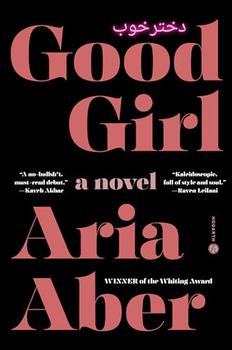Summary | Excerpt | Reviews | Beyond the Book | Read-Alikes | Genres & Themes | Author Bio

A Novel
by Aria AberThis article relates to Good Girl
 In Aria Aber's Good Girl, narrator Nila spends her teenage years in the labyrinths of Berlin's legendary techno clubs. Awash with drugs and unrestrained by straight-laced sexual mores, the Berlin club scene was hand-built by grassroots pioneers into a recognized cultural institution, eventually attracting visitors from across the globe desperate to sample its anything-goes spirit.
In Aria Aber's Good Girl, narrator Nila spends her teenage years in the labyrinths of Berlin's legendary techno clubs. Awash with drugs and unrestrained by straight-laced sexual mores, the Berlin club scene was hand-built by grassroots pioneers into a recognized cultural institution, eventually attracting visitors from across the globe desperate to sample its anything-goes spirit.
West Germany first began developing a taste for electronic music in the 1980s, influenced by the emerging techno artists of Detroit. But it was only after the fall of the Berlin Wall in 1989 that the capital city's club scene truly exploded. With huge numbers of East Berliners migrating westward, large swathes of former communist neighborhoods were abandoned—allowing for a rapid influx of poor artists and radicals. Squatting in empty apartment blocks, and sometimes entire streets, these communities cultivated a DIY ethos and atmosphere of boundless experimentation that marked a break from both the capitalism of the West and the repressive communism of the East. (Some original collectives survive to this day, despite numerous attempts by developers to evict them from their premises.)
With newfound freedom, clubs began popping up throughout Berlin in the early 1990s. And in the true spirit of the city's squats, these first clubs emerged out of raves held illegally in abandoned buildings, often right in the city center. Tresor and WMF, for example—set up in the basement of an old department store and a defunct kitchenware factory, respectively—could be found at Potsdamer Platz, better known as home to the Ritz Carlton and the Berlin Philharmonic. But perhaps the most emblematic venue of early Berlin techno was Bunker, the site which lends its name to Aber's fictional club in Good Girl. Known as being "the hardest club on earth," Bunker was housed in an imposing Nazi-era air-raid shelter in the heart of the city. Alongside the music, it was renowned for its "Snax" nights: male-only "pervy parties" with a fetish gear dress code.
Despite being widely popular in the Berlin underground, these uninhibited all-night raves were held in lower esteem by the German authorities. Only a handful of the first pop-up clubs survived the '90s and its waves of eviction and forced closure. In the decades that followed, however, club owners began laying the foundations for longer-term stability. Clubs like Tresor and the sex-positive KitKatClub found more permanent venues on Köpenicker Straße, while the now-legendary Berghain, opened in 2004 in a cavernous former power plant, can trace its origins to Bunker, Snax parties, and the early pioneers of Berlin techno.
Today, an estimated €1.5 billion is generated annually by the city's club culture, mostly through tourism; Berghain has been officially designated a "cultural institution," granting it the same tax benefits as museums and theatres. Given the radical anti-establishment ethos on which the scene was founded, this absorption into the German cultural fabric sits uneasily with some die-hard adherents. Even the Berlin city website admits its nightlife today is "a somewhat more commercial experience than the illegal raves of the '90s."
Nevertheless, Berlin club owners see state aid as paramount to surviving long into the 21st century. Sky-high operating costs, emboldened real-estate investors, and the past and ongoing damage of Covid spell existential threat for the sector—fears made manifest by the recent closure of the clubs Watergate and Wilde Renate, two mainstays opened in the 2000s. The Berlin Club Commission, a body comprising club owners and event organizers, recently released a report stating almost half of clubs surveyed were considering shutting up shop in 2025. The German language has even invented a new word for the phenomenon: Clubsterben. Club death. The landscape looks bleak for all-night ravers, and only time will tell if this vibrant, unique culture can hang on.
Berlin club Tresor in 2003, via Wikimedia Commons
Filed under Places, Cultures & Identities
![]() This article relates to Good Girl.
It first ran in the February 12, 2025
issue of BookBrowse Recommends.
This article relates to Good Girl.
It first ran in the February 12, 2025
issue of BookBrowse Recommends.
There is no such thing as a moral or immoral book. Books are either well written or badly written. That is all.
Click Here to find out who said this, as well as discovering other famous literary quotes!
Your guide toexceptional books
BookBrowse seeks out and recommends the best in contemporary fiction and nonfiction—books that not only engage and entertain but also deepen our understanding of ourselves and the world around us.